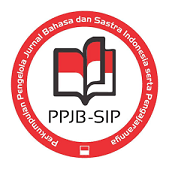PELAKSANAAN EVALUASI PEMBELAJARAN DALAM TEKS ANEKDOT PADA KELAS X DI SMA NEGERI 1 SINGARAJA: TINJAUAN DARI SEGI VALIDITAS ISI DAN PEMANFAATAN HASIL EVALUASI
DOI:
https://doi.org/10.23887/jjpbs.v3i1.5022Abstract
Penelitian ini bertujuan untuk mendeskripsikan (1) tes buatan guru dalam pelaksanaan evaluasi pembelajaran teks anekdot pada siswa kelas X SMA Negeri 1 Singaraja (2) validitas isi tes dalam pelaksanaan evaluasi pembelajaran teks anekdot pada siswa kelas X SMA Negeri 1 Singaraja (3) pemanfaatkan hasil evaluasi oleh guru dalam pelaksanaan evaluasi pembelajaran teks anekdot pada siswa kelas X SMA Negeri 1 Singaraja (4) pemanfaatkan hasil evaluasi oleh siswa dalam pelaksanaan evaluasi pembelajaran teks anekdot pada siswa kelas X SMA Negeri 1 Singaraja. Untuk mencapai tujuan tersebut, peneliti menggunakan rancangan deskriptif kualitatif. Subjek penelitian ini adalah (1) guru bahasa Indonesia kelas X SMA Negeri 1 Singaraja dan (2) siswa kelas X SMA Negeri 1 Singaraja. Pengumpulan data dalam penelitian ini menggunakan metode dokumentasi, kuesioner/angket, dan wawancara. Data dianalisis dengan menggunakan teknik deskriptif dengan menggunakan prosedur sebagai berikut (1) identifikasi data, (2) rediksi data, (3) penyajian data, dan (4) penarikan simpulan. Hasil penelitian ini menunjukan bahwa (1) Tes buatan guru dalam pelaksanaan evaluasi pembelajaran teks anekdot sudah sesuai dengan isi silabus dan setiap butir soal sudah menunjukkan secara jelas kompetensi dasar yang akan diukur, (2) Setiap butir soal yang digunakan dalam pelaksanaan evaluasi pembelajaran teks anekdot sudah valid dari segi validitas isi dan tergolong memiliki tingkat validitas yang tinggi, (3) Guru telah memanfaatkan hasil evaluasi untuk berbagai kepentingan pembelanjaran, dan (4) Pemanfaatan hasil evaluasi bagi siswa tidak hanya untuk kepentingan evaluasi pembelajaran. Adapun manfaat yang diperoleh siswa dari hasil evaluasi, yaitu untuk kepentingan evaluasi proses belajar pembelajaran di dalam kelas dan di luar kelas.Kata Kunci : Evaluasi, teks anekdot, validitas isi, pemanfaatan hasil
This research aimed to describe of (1) teacher-made tests in the evaluation of learning anecdotal text for student in X class SMA Negeri 1 Singaraja (2) content validity test in the evaluation of learning anecdotes text for student in X class SMA Negeri 1 Singaraja (3) utilizing the results of the evaluation by the teacher in the evaluation of learning anecdotes text for student in X class SMA Negeri 1 Singaraja (4) utilizing the results of the evaluation by the students in the evaluation of learning anecdotes text for student in X class SMA Negeri 1 Singaraja. To achieve these objectives, the researchers used a qualitative descriptive design. The subjects were is (1) Bahasa Indonesia teacher of X class SMA Negeri 1 Singaraja and (2) students in X class SMA Negeri 1 Singaraja. Collecting data in this research using the methods of documentation, questionnaires / questionnaire, and interviews. Data were analyzed using descriptive techniques using the following procedure (1) identification of data, (2) data reduction, (3) presentation of data, and (4) conclusions. These reserch results indicate that (1) teacher-made tests in the evaluation of learning anecdotes text is in conformity with the contents of the syllabus and each item has been clearly demonstrated basic competence to be measured, (2) Every tests item that is used in the evaluation of learning anecdotes text is valid in terms of content validity and classified as having a high degree of validity, (3) Teachers have made use of evaluation results for various learning needs, and (4) Utilization of evaluation results for students not only for the sake of learning evaluation. The benefits derived from the results of the evaluation of students, namely for the purpose of evaluation and learning process in the classroom and outside the classroom.
keyword : Evaluation, anecdotal text, content validity, the utilization of
Published
2015-06-11
Issue
Section
Articles
License
Authors who publish with the Jurnal Pendidikan Bahasa dan Sastra Indonesia Undiksha agree to the following terms:- Authors retain copyright and grant the journal the right of first publication with the work simultaneously licensed under a Creative Commons Attribution License (CC BY-SA 4.0) that allows others to share the work with an acknowledgment of the work's authorship and initial publication in this journal
- Authors are able to enter into separate, additional contractual arrangements for the non-exclusive distribution of the journal's published version of the work (e.g., post it to an institutional repository or publish it in a book), with an acknowledgment of its initial publication in this journal.
- Authors are permitted and encouraged to post their work online (e.g., in institutional repositories or on their website) prior to and during the submission process, as it can lead to productive exchanges, as well as earlier and greater citation of published work. (See The Effect of Open Access)







